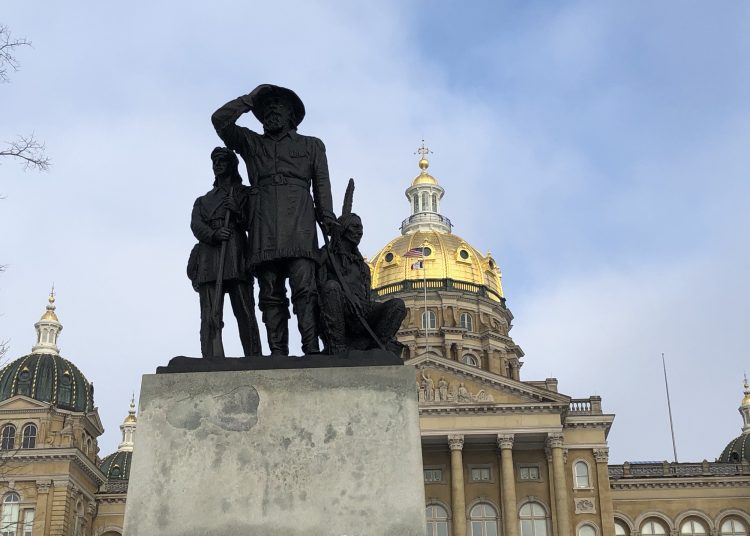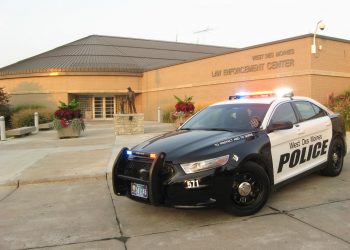DES MOINES, Iowa – The Iowa House on Thursday night approved an appropriations bill for PreK-12 public education funding by a 56 to 36 mainly party-line vote.
Iowa House Republicans reached a deal with Iowa Senate Republicans adopting the Senate version of the bill, SF 269, that passed earlier in the week by a 32 to 17 in the Iowa Senate, with an agreed upon amendment. The Iowa House amendment sets the growth rate for state supplemental aid at 2.4 percent. This represents an additional $115 per student, increasing the state’s cost per student to $7,227 in state supplemental aid. The growth rate for state categorical aid is also 2.4 percent. The Iowa House’s original bill set the growth rate at 2.5 percent, while the original Iowa Senate bill set it at 2.2 percent.
The amendment also lowers the $15 increase in the Iowa Senate bill to the base state cost per pupil starting in Fiscal Year 2022 to $10. The amendment also simplifies the Iowa Senate bill’s language for money transferred from the general fund to the transportation equity fund.
The amendment also stripped a one-time “qualified instruction funding supplement” of $65 per student that was in the original Senate bill for qualified school districts for costs related to COVID-19. It required schools that receive this funding to be “brick-and-mortar” school districts that didn’t fail to comply with state law regarding in-person instruction without a waiver. Instead, the Iowa House Appropriations Committee approved HF 439 by a 14 to 8 party-line vote on Monday. The House version, now a separate bill, offers $30 million as a one-time funding supplement that is divided between school districts in proportion to the number of in-person learning days school districts had between August 23, 2020, and January 29, 2021.
State Rep. Cecil Dolecheck, R-Mount Ayr, who managed the bill on the floor, said that the bill’s rate of growth increase represents a total of approximately $36.5 million.
State Rep. RasTafari Smith, D-Waterloo, attempted to increase the rate of growth to 3.85 percent through an amendment that failed.
He chastized Iowa House Republicans for not taking up the education appropriations bill sooner, breaking Iowa law for not passing the bill within 30 days from when Gov. Kim Reynolds released her budget to the legislature. By law, she had a February 1 deadline but transmitted the budget on January 12.
“The clock started then. The party of law and order have not enacted school funding as of the end of business yesterday has not only broken the law, but it’s also failed its obligation to educators, students, and families across the state. If I believed in that practice, it would be an act worthy of a citizen’s arrest,” Smith said.
He pointed out different bills that, he said, took priority over students during the legislative session.
State Rep. Jeff Shipley, R-Birmingham, offered an amendment that would have prohibited schools from requiring masks. The amendment was found out-of-order.
State Rep. Molly Donahue, D-Cedar Rapids, complained about the funding levels represented in the bill.
“My issue here is that we have a surplus of millions of dollars, and we are lowering funding for 137 schools. Forty-two percent of them are going to be on a budget guarantee. That’s 31 more than last year because of this bill. This is the 11th year of underfunding of our schools. And that has taken a toll on many things, from our school programs for our students to recruiting teachers,” she said.
State Rep. Mary Mascher, D-Iowa City, also objected to the funding levels.
“Budgets are about priorities, and during a pandemic, it’s critical for us to get our priorities straight. Public Schools are about the future of our children,” she said.
Mascher said that children in schools are suffering. Lawmakers are the ones many families are looking to address their suffering, pointing out students dealing with food insecurity, students with mental health issues, and families facing eviction. She then noted some of the ways schools address students in need.
“So every dollar we invest in our public schools is valuing our children, and to me, that’s the most important investment of all,” she said.
State Rep. Tracy Ehlert, D-Cedar Rapids, an early childhood educator, complained about what she said were cuts to preschool funding. The Legislative Services Agency said in their fiscal note, the bill would cause a decrease of $7.4 million (8.38 percent) in preschool formula funding compared to FY 2021 due to enrollment.
“As many of us know most brain development occurs well before the age of four. So it’s critically important that Iowa students receive quality early childhood programming to prepare them for academic and personal successes. High quality preschool sets the stage for a thriving workforce for both today and tomorrow,” she said.
State Rep. Cindy Winckler, D-Davenport, said the enrollment drop was due to parents “redshirting” their four-and-five-year-olds because of COVID-19 since preschool nor kindergarten is required.
“School enrollment dropped 6,000 this year, and most of them will return to the classroom next year, and schools will have to stretch the inadequate resources even further,” she said.
State Rep. Art Staed, D-Cedar Rapids, also criticized the bill.
“With declining enrollment, many of our other districts will be on a budget guarantee, which you and I both know impacts local property taxpayers,” he said. “I know our school staff and instructional leaders have gone above and beyond to keep our students safe, yet academically progress. It’s been a crazy year. Our public school institutions need your legislative support. I encourage you to increase the state contribution.”
Shipley, a Republican whose amendment was found to be out of order earlier in the debate, spoke in opposition to the bill, but for a different reason than Democrats.
“The resources are important. But for me, it’s also very important to determine how these resources are spent and to ensure that they’re being spent effectively. So we can grow in efficiency in our institutions,” he said.
Shipley voted against the transportation equity fund in 2019. He said the funding was short-sighted, and the legislature didn’t envision how future classrooms would look.
He noted schools in his district have also experienced an enrollment crisis.
“In my area, the enrollment crisis is because families do not feel supported or listened to by their school board or administrators,” Shipley said.
State Rep. Phyllis Thede, D-Davenport, insinuated that families a Iowa due to the level of PreK-12 funding.
“We’ve got to look at this much differently. I’m going to tell you why. Our students and parents, they’re leaving here, they’re leaving Iowa. And we’ve got to start bringing them back. And if we want to do that, we’ve got to find ways to bring people here. I don’t want to lose any more Iowans. I don’t want to lose any more students,” she said.
In his closing remarks, Dolecheck said there could be additional funds the legislature looks at for PreK-12 funding later in the year. He said the funding level was something that would give schools some certainty and fit within the budget.
“Granted, this bill will have 137 school districts on a budget guarantee. None of us like that. But we do have within this bill, of course, picking up that portion that falls above the budget guarantee within this, as we have done for quite some time, in the property tax replacement piece,” he said.
The Iowa Senate will now have to consider the amended bill.
This article has been corrected. The article originally read that the qualified instruction funding supplement of $65 per student was in the bill when it passed, but it was stripped out.















